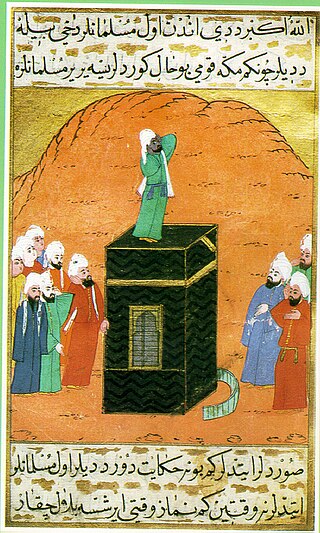Muezzin
Person appointed at a mosque to lead and recite the call to prayer From Wikipedia, the free encyclopedia
The muezzin (/m(j)uˈɛzɪn/;[1] Arabic: مُؤَذِّن, romanized: Muʾaḏḏin), also spelled mu'azzin, is the person who proclaims the call to the daily prayer (ṣalāt) five times a day (Fajr prayer, Zuhr prayer, Asr prayer, Maghrib prayer and Isha prayer) at a mosque from the minaret.[2][3] The muezzin plays an important role in ensuring an accurate prayer schedule for the Muslim community.


Etymology
The English word muezzin is borrowed from Arabic: مُؤَذِّن, muʾadh·dhin [mu.ʔað.ðin], simplified mu'azzin,[4] the active participle of Arabic: أَذَّنَ "to call". Thus, it means "the calling one".
Roles and responsibilities
Summarize
Perspective
The professional muezzin is chosen for his good character, voice and skills to serve at the mosque. Muezzins are typically men.[5] The muezzin is not considered a cleric, as he cleans the toilets and the place where people wash their hands, face and feet when they perform the Wuḍu' (Arabic: wuḍū’ وُضُوء, the "purification" of ablution) before offering the prayer.[6] When calling to prayer, the muezzin faces the qiblah, the direction of the Ka'bah in Makkah, while reciting the adhan.[7][dubious – discuss]
From the fourteenth century, initially in Mamluk Egypt but then spread into other parts of the Islamic world, major mosques might employ a related officer, the muwaqqit, who determined the prayer times using mathematical astronomy. Unlike the muezzin, who were typically chosen for their piety and beautiful voice, the qualification of the muwaqqit required special knowledge in astronomy.[8][9] Historian Sonja Brentjes speculates that the muwaqqit might have evolved from a specialised muezzin,[10] and that there might not have been a clear delineation between the two offices.[11] Some celebrated muwaqqits, including Shams al-Din al-Khalili and ibn al-Shatir, were known to have once been muezzins, and many individuals held both offices simultaneously.[12] Today, with the production of electronic devices and authoritative timetables, a muezzin in a mosque can broadcast the call to prayer by consulting a table or a clock without requiring the specialised skill of a muwaqqit.[13]
Call of the muezzin
The call of the muezzin is considered an art form, reflected in the melodious chanting of the adhan. In Turkey there is an annual competition to find the country's best muezzin.[14]
Historically, a muezzin would have recited the call to prayer atop the minarets in order to be heard by those around the mosque. Now, mosques often have loudspeakers mounted on the top of the minaret and the muezzin will use a microphone, or a recording is played, allowing the call to prayer to be heard at great distances without climbing the minaret.
Origins
The institution of the muezzin has existed since the time of Muhammad. The first muezzin was a former slave Bilal ibn Rabah, one of the most trusted and loyal sahabah (companions) of the Islamic prophet Muhammad. He was born in Mecca and is considered the first mu'azzin, chosen by Muhammad himself.[15][16][17][18]
After minarets became customary at mosques, the office of muezzin in cities was sometimes given to a blind man, who could not see down into the inner courtyards of the citizens' houses and thus could not violate privacy.[19]
Notable muezzins
See also
- Salah, Muslim daily prayer
- Adhan, the Islamic call to prayer, recited by the muezzin
- Schulklopfer, the Jewish equivalent of the muezzin
- Loudspeakers in mosques
References
Bibliography
Further reading
External links
Wikiwand - on
Seamless Wikipedia browsing. On steroids.
